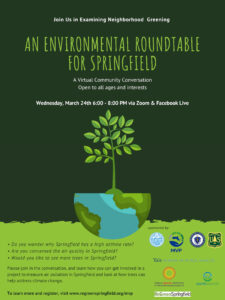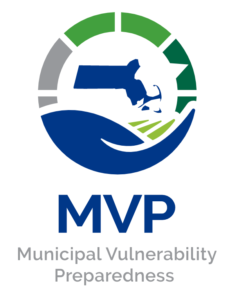 JOIN US FOR…
JOIN US FOR…
AN ONLINE ENVIRONMENTAL ROUNDTABLE FOR SPRINGFIELD
‘Examining Neighborhood Greening in Springfield
-
- A Virtual Community Conversation
- Open to All Ages and Interests
- A Virtual Community Conversation
March 24, 2021 • 6:00 – 8:00 PM via Zoom and Facebook Live
CLICK HERE TO REGISTER AND RECEIVE LOG-ON INFORMATION
Please plan to join a virtual community roundtable discussion on March 24th, from, 6-8 pm on Zoom and Facebook Live. Sponsored by ReGreen Springfield and the City of Springfield, in partnership with Live Well Springfield, Yale University School of Public Health, the US Forest Service, Earthwatch, the Massachusetts Municipal Vulnerability Program and Attorney General Maura Healy’s office, this event will provide information on current research and community engagement programs taking place in Springfield.
During the session you can learn how you can help to plan for the installation of air-quality monitors across the city, in order to better understand how air pollution impacts public health. You can help us decide where to place those monitors!
Join online, and participate in the community forum that will help to guide future programming in Springfield as we work to make our city greener, healthier and more livable.
** PLEASE CLICK HERE TO REGISTER AND RECEIVE LOG-ON INFORMATION **
 The Massachusetts Municipal Vulnerability Preparedness (MVP) grant program created in 2017 as part of Governor Baker’s Executive Order 569 provides support for cities and towns in Massachusetts to identify climate hazards, assess vulnerabilities, and develop action plans to improve resilience to climate change.
The Massachusetts Municipal Vulnerability Preparedness (MVP) grant program created in 2017 as part of Governor Baker’s Executive Order 569 provides support for cities and towns in Massachusetts to identify climate hazards, assess vulnerabilities, and develop action plans to improve resilience to climate change.
The Springfield Municipal Vulnerability Project (MVP), aims to bring information, tools and science related to helping Springfield address global climate change at the local level.
The following issues are being addressed, at the neighborhood live, in the Springfield MVP Project:
-
-
-
-
-
- Nature-Based Solutions – Nature-Based Solutions (NBS) are adaptation measures focused on the Protection, Restoration, and/or Management of ecological systems to safeguard public health, provide clean air and water, increase natural hazard resilience, and sequester carbon. Incorporating NBS in local planning and design projects produces long-term solutions that benefit human and natural systems.
- Public Health & Healthcare – Climate change hazards experienced in communities across the Commonwealth impact our health and our healthcare sector’s ability to provide necessary services. A history of systemic injustice means that climate change disproportionately affects communities of color and low-income communities (as described in EEA’s 2017 EJ Policy). As a result, these communities are more likely to experience the negative health impacts of climate change, that range from medical and physical health impacts to mental health and community health impacts.
- Environmental Justice & Equity – Global climate change is a local environmental justice issue because it has disproportionate impacts on socially vulnerable populations in Massachusetts. With climate change expected to exacerbate current and future vulnerabilities in our communities, the Springfield MVP is delivering programming and opportunities that present a clear focus on addressing existing environmental, economic, and social disparities across the city.
-
-
-
-
Goals for the program include:
-
-
-
-
-
- Enlisting citizen-scientists to assist in collecting data and information on the local environment.
- Providing neighborhood residents useful steps that they can take to help address the environment where they live
- Conducting environmental educational program for residents of a ages.
- Helping to bring environmental change to Springfield.
-
-
-
-
